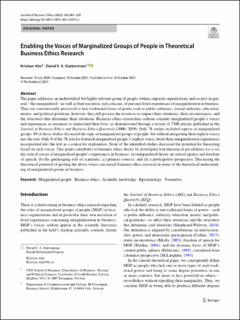| dc.description.abstract | The paper addresses an understudied but highly relevant group of people within corporate organizations and society in general—the marginalized—as well as their narration, and criticism, of personal lived experiences of marginalization in business. They are conventionally perceived to lack traditional forms of power such as public influence, formal authority, education, money, and political positions; however, they still possess the resources to impact their situations, their circumstances, and the structures that determine their situations. Business ethics researchers seldom consider marginalized people’s voices and experiences as resources to understand their lives, as demonstrated through a review of 7,500 articles published in the Journal of Business Ethics and Business Ethics Quarterly (2000–2019). Only 78 studies included aspects of marginalized groups. Sixty-nine of those studies discussed the topic of marginalized groups of people, but without integrating their explicit voices into the text. Only nine of the 78 articles featured marginalized people’s explicit voices about their marginalization experiences incorporated into the text as a source for exploration. None of the identified studies discussed the potential for theorizing based on such voices. This paper contributes to business ethics theory by developing four theoretical possibilities vis-à-vis the critical voices of marginalized people’s experiences in business: (a) marginalized theory on critical agency and freedom of speech; (b) the gatekeeping role of academia; (c) primary sources; and (d) a participative perspective. Discussing the theoretical potential of quoting the above voices can enrich business ethics research in terms of the theoretical understanding of marginalized groups in business. | en_US |

